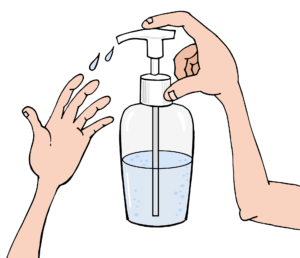Obsessive Compulsive Disorder
Introduction
OCD stands for obsessive compulsive disorder.
You may not have heard of its official name, but I am positive that you have heard of the shorter version: OCD.
Most people use the word OCD, to describe someone who is overly clean, tidy, or organised. Others may describe it as, someone who washes their hands too much; even someone who is afraid of dirt.
You may be reading this as a concerned relative, friend, or just for yourself. You may even be reading this, just because you are interested in the topic. If you or your loved ones have OCD, you may have noticed signs of it worsening, or relapsing due to coronavirus, so it may be beneficial to have a read of this text.
This article is here for you to browse through. It will explain what OCD is, the known symptoms and the measures you can take to control it.
What is OCD?
Obsessive Compulsive Disorder (OCD) takes place when a person constantly overthinks a situation and tries to take actions to remedy it.
Think of it in this way: you touch the door handle, but you think it has germs on it. The action you take is to wash your hands immediately.

It is a condition that affects all ages and genders. Symptoms may appear during puberty, but can begin as early as 18 years old.
Symptoms
OCD symptoms can be broken down into 2 categories: obsessive and compulsive.
– Obsessive, refers to the constant flow of negative thoughts, or emotions. Ones that you cannot get rid of completely.
– Compulsive, are the actions you take to relieve you from those emotions. These are mostly repetitive motions and actions, or mental imaging that reduces your discomfort.
Example of an OCD Situation
You touched the door handle with your bare hands. Emotions of disgust, worry, or a fear of germs fill your mind. You quickly go to wash your hands.
Because of covid-19, you may overdo it by spraying the door handle with antibacterial spray. Then you might go to wash your hands again. For others, you may even be unwilling to take a step outside, due to the risks you could face.
During covid-19, having OCD just amplifies your feelings of danger and insecurity and the frustration you feel over your compulsions can just make you feel worse.
Treatments
There are two types of treatment plans to manage your OCD: Therapy and Medicine.
Cognitive behavioural therapy (CBT) is the most common type of therapy used, which helps you to control your compulsions better. This is through making you face your fears in a physical sense.
From the example shown above, it would be to touch the door handle and stop yourself from washing your hands.
Medicine is another form used to control your OCD. This is mainly through an antidepressant medicine made solely for OCD patients.
Coronavirus-19, OCD and Coping
Having OCD during covid-19 can be a struggle. This is especially the case, when dealing with anxiety caused by the risk of infection.
What you can do:
– Limit News
Watching the news to a limit of 15 minutes, will allow you to be updated about the latest guidelines and procedures. Watching more than that can cause feelings of worry and fear.
– Follow Guidelines
Do not overdo the advice on guidelines. If the guidelines ask you to wash your hands for 20 seconds, try to wash it in that timeframe as much as you are able.
– Seek Support
You can talk to your doctor or therapist when you feel overwhelmed. Talking over the phone or online are also options you could take.
– Family and Friends
Staying in touch with family and friends can have a positive effect on you. They are the people who understand you and can help you as a positive distraction.
– Distraction
Do things that will keep your mind occupied. This way you will not have the time to think about the negatives.



